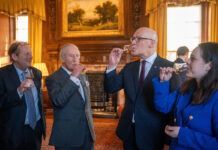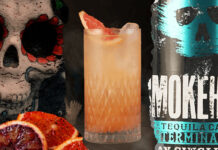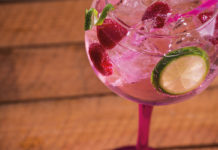A strong range served by well-trained staff is the way to go, firms say
PREMIUM spirits are booming at the moment with a new small-batch brand seemingly popping up every week, but it’s not just producers who can cash in on the trend – this customer thirst for quality is good news for publicans too.
With spirits showing no sign of slowing, the firms behind some of the best-known premium brands in the on-trade have advised there are several steps publicans can take to drive sales.

Sian Buchan, brand ambassador for Scottish gin Caorunn, reckons premium spirits “have never been more popular” in the Scottish on-trade.
“Knowledge of customers has improved a lot over the past few years as everything from celebrity endorsements introducing higher end products to bartenders receiving more knowledge via training from brands means they are passing that knowledge on,” she said.
As it stands, Buchan said the Scottish trade continues to focus “a lot on locality”, which is good news for sales of Scottish spirits.
However, she also suggested spirits from further afield may become prominent in the Scottish on-trade in the near future.
“The north of England is really big on rum, tequila and mezcal, which I feel could come north of the border,” said Buchan.
For publicans who wish to encourage their customers to try something new, Buchan said producing a premium spirits menu for tables will encourage customers to try more options and added that serves on offer can have a big impact on sales.
Colin Dunn, whisky ambassador for Diageo Reserve, which looks after brands including Johnnie Walker and Cîroc Vodka, said interest in premium spirits gives operators “a great opportunity to enhance their offering of simple serves using premium spirits to deliver quality taste and creative drinks”.
And Richard Barlow, customer marketing director at Diageo GB, agreed that the right serve can have a big impact on spirits sales.
Barlow said operators should consider both the style of outlet they run and the clientele when constructing a cocktail list.
“Outlets offering cocktails for the first time should choose a short, well thought-out list with five to eight cocktails, covering the best-selling cocktails,” he said.
Barlow also had a few suggestions for which cocktails licensees should look to introduce first.
Diageo GB’s research places the Mojito as the UK’s best-selling cocktail and Barlow said other popular cocktails included the Woo Woo, Long Island Iced Tea and Cosmopolitan.
To ensure these cocktails are a hit, Barlow added that staff should be trained in the recipes to a level where they can be delivered perfectly every time.
Maxxium UK sales director Andrew Morrison echoed this, suggesting that staff experience in cocktail making should be a key consideration when building a menu.
“A cocktail menu featuring a limited selection of drinks staff are comfortable with making and the bar has the facilities to create is much more desirable than a long list which creates uncertainty.
“Quality over quantity is the key here,” said Morrison
Staff training shouldn’t be limited to recipes, however.
Morrison said bartender knowledge of brands is also a “big influencer” on drinkers’ choices.
“Make sure your bar staff are fully trained in the products that they are using, what makes them different from the other brands in the category, as well as how to make great drinks,” he said.
Neil Boyd, of Ian Macleod Distillers, the firm behind Tamdhu and Glengoyne, also highlighted the importance of product knowledge in the premium spirits category.
Boyd said customers have high expectations when they approach the bar.
“Consumers today expect bar staff to understand both the individual brands and how best they should be served,” said Boyd.
“It is vital that operators within the licensed trade make the effort to educate bar staff in order to deliver this service.”
Boyd added that while not all customers will want a cocktail serve, that shouldn’t prevent operators from stocking premium spirits.
Beluga Vodka brand manager Alexandra Byrne agreed that staff can play an important role in driving premium spirits sales.
“Generally, [customers] are happier to trade up to a premium product if there are appropriately trained bar staff available to educate consumers on the drink in question,” said Byrne.
And Dan Bolton of Hi Spirits, the firm behind Brooklyn Gin, described staff knowledge as “essential to building sales of premium brands”.
But he added that it’s not the only step operators can take to advertise the premium spirits range in their venue.
Bolton reckons the way operators kit-out their outlet can also have a big impact on sales of premium spirits.
“Operators should never forget that many customers arrive at their venue and walk up to the bar without knowing what they plan to order,” said Bolton. “Posters, printed drinks menus, chalkboard cocktail lists and POS such as bar runners can all be used to influence customers at the point of purchase.”























